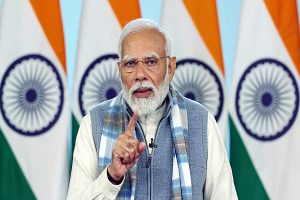In the intricate realm of international relations, where the tides of diplomacy ebb and flow, the death sentence handed down on eight former Indian Navy personnel in Qatar has emerged as a testament to the delicate ties between nations. Now, the Qatari court’s acceptance of the appeal against the death sentence of the eight who were accused of espionage marks a significant juncture in a narrative that initially seemed shrouded in uncertainty. The sentence ~ by the court of First Instance ~ sent shockwaves not only through families of the accused but also reverberated across diplomatic channels.
The acceptance of the appeal is not just a legal victory. It is a triumph of diplomacy, a subtle yet potent reminder that dialogue and engagement remain formidable tools in resolving international disputes. The External Affairs Ministry’s immediate reaction characterised the verdict as “deeply” shocking. This visceral response was not just a diplomatic formality. It was a reflection of the profound concern and determination to explore every legal avenue available. The pledge to leave no stone unturned demonstrated a government’s unwavering dedication to safeguarding the rights and lives of its citizens. The accused, all former Indian Navy personnel, faced charges under Qatari law. The complexity of navigating foreign legal systems added layers of challenge to an already precarious situation. The fact that the court agreed to hear the appeal without specifying a timeline injects an air of cautious optimism into the proceedings. While it does not guarantee an acquittal, it does signal a willingness to re-evaluate the case. Amidst the legal intricacies, the political landscape came alive with the Congress party urging the government to expedite the release of these individuals. Congress leader Jairam Ramesh’s call for leveraging diplomatic and political influence with the Qatari government echoes a sentiment that transcends party lines – the urgency of securing the release of fellow countrymen. The detainees, identified as Captain Navtej Singh Gill, Captain Birendra Kumar Verma, Captain Saurabh Vasisht, Commander Amit Nagpal, Commander Purnendu Tiwari, Commander Sugunakar Pakala, Commander Sanjeev Gupta, and Sailor Ragesh, were not just names on a court document. They were, and are, individuals with families, dreams, and a shared history of service to their nation.
The relief granted by Qatari authorities, allowing the former navy personnel to move from solitary confinement to shared jail quarters with colleagues, offers a glimmer of humanity in an otherwise grim scenario. It underscored the importance of acknowledging the human aspect in the pursuit of justice. In the grand tapestry of international affairs, this episode serves as a poignant reminder that diplomacy, when conducted with sincerity and perseverance, can influence even dire outcomes. As the legal proceedings unfold, the global community watches, hopeful that a fair evaluation of the appeal will be conducted, ultimately steering these former navy men away from the precipice of an irrevocable fate.












